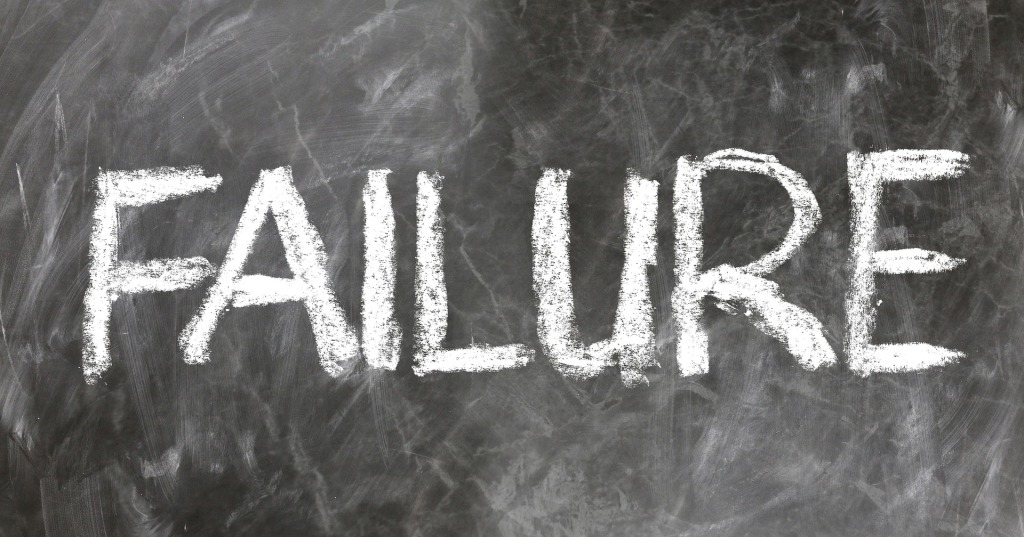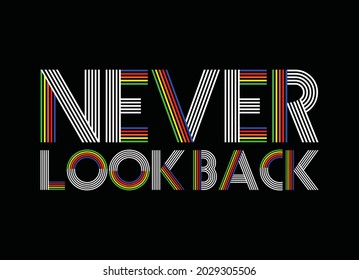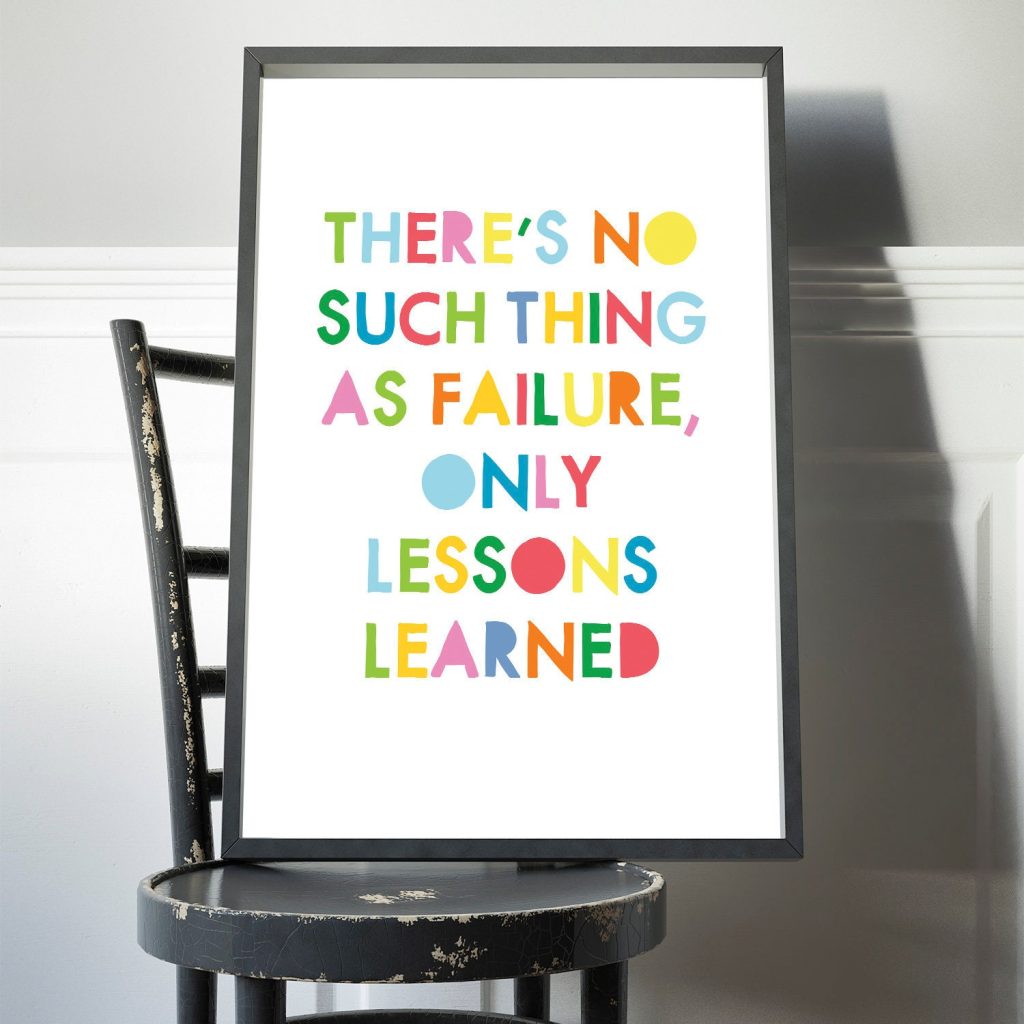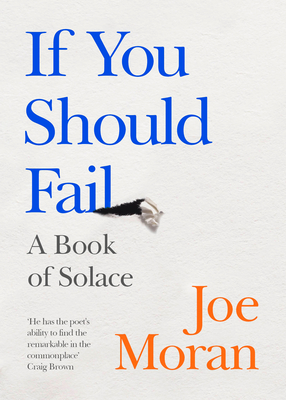It’s time to forget what you think of failure.

Failure, eh? We’ve all heard of it, felt it, watched others go through it – and some go so far past it that their life is a steaming pile of success (for my recent article on the 5 Shapes of Success, click here).
What is failure exactly? How do we define it? Is it the opposite of success? Is it reaching for something and not quite making it? Is it the absence of success? Is it wrong? Is it right?
Dictionary.com defines failure in seven ways. They are:
- An act or instance of falling or proving unsuccessful: lack of success: His effort ended in failure. The campaign was a failure
- nonperformance of something due, required, or expected: a failure to do what one has promised; a failure to appear
- a subnormal quantity or quality; an insufficiency: the failure of crops
- deterioration or decay, especially of vigor, strength, etc: the failure of her health made retirement necessary
- a condition of being bankrupt by reason or insolvency
- a becoming insolvent or bankrupt: the failure of a bank
- a person or thing that proves unsuccessful: He is a failure in his career. The cake is a failure
All widespread perceptions of failure. But are they also misrepresentations of failure?
Has failure been cast the villain with it’s own Bond style lair somewhere under the Sahara – sweltering under the hot sand of success; only spoken about when someone gets burnt.
In Joe Moran’s If You Should Fail: A Book of Solace, this is the concept put forward. Failure has been misrepresented. In our pursuit for the golden streets of success we’ve painted failure as the negative colleague who, despite the recent pay-rise; new, modern office interior; and cheery surroundings; sucks the good, the bright, and the positive from every room they enter.
The truth is much more mesmeric. We all are failures – but not quite the way you might think.
Never Look Back. Or why failure is not a lesson

Moran tells us that the Ancient Greeks perceived failure as the direct result of defying the gods – with punishment ultimately dealt out by the goddess Nemesis. Defiant mortals who’d fly too close to the sun suffered the anguish of Nemesis for ever attempting it.
It’s us who breed failure because we aim for something better.
“The foundational myth of failure is that it is our own fault”
Joe moran
This concept has morphed into the personification of failure in the homeless. We move away from the sleeping bags sagged into cardboard bases, surrounded by bottles and bulged Tesco bags. They are designated door-ways that no-one uses in streets where no-one walks. Cast from the mind of the wider public because of the assumption that it was all their fault.
They failed due to drugs, drink, or keeping a job. They went against society in a way that doesn’t meet the popular perception. This is now their punishment.
And sometimes we offer scraps – a one-off coffee; a few pennies; maybe a meal; both to subconsciously satisfy our altruistic side and to condescendingly remind them that they failed.
“The story we tell ourselves about homelessness is so often about the failure of its victims”
Moran, J, If You Should Fail
But have they failed, or is it the perception of those 9-5ers, so solidly secure in their ironed shirt and striped tie, that is tinted?
Look in the Mirror. Do You See Failure?

We all wake with goals.
Some are short and quickly met, like showers, breakfast and morning coffees.
Others may take longer, like buying a house; buying a car; mending that relationship; or working through that university course.
Success is usually the description assigned when we meet any of these goals listed above (arguably the most successful out of the list: the morning coffee). But what when we fail to meet them? Are we then perceived as failures as well? Do we become stranded from success and pariah-ed like the homeless who make the streets their home?
“But that young man and I were not so different. As I watched him through my window, I was fairly sure of one thing: both of us felt like failures”
From If you Should Fail: a book of solace
Moran compares his failure, of not succeeding at his work that he’d undertaken in the past year, with the homeless man outside his office window. A whole 365-and-a-quarter days in the skip with the debris and faulty electrical appliances; with only the failure rung loud to show the last twelve months, at least professionally,had ever happened.
With that comparison, Moran puts forward the idea that failure is a perception. The homeless man, who he’d veered round; avoided eye contact; but eventually rang a shelter for; is no different from his failure of a failed work project.
Both, in the strictest sense of the word, failed.
Enough of Failure, Fight it with Success

So how do we fight against the popular perceived notion of failure? That if we fail, just like the homeless Moran veered away from, we risk being shunned – or worse, ignored and eventually forgotten.
We work towards the shining concept of success, that’s how. Or, at least, that’s what we’re told; and from a very young age.
Perceived as failure’s opposite – the Harry Potter to failure’s Voldemort (sorry, he who shall not be named) – success is gold and quite frankly, there isn’t enough of it going round.
We can feel shame, humiliation, inadequacy, when we fail. But when we succeed, we feel like we’re bulletproof ; ready to fly; or ten-feet tall.
Or, as Moran put’s it:
“We try to build immunity to the pathogen by accumulating reserves of its universal antibody: success”
We fear failure, and the consequences if we should fail, so much so – that we constantly strive for success (for more on success, click here)
But, consider these concepts of failures for a second:
- the grade A student who just got a B
- the Michelin star chef about to lose their star
- the Premier League winners relegated the following season
- or, the internet start-up who raised millions, but just filed for bankruptcy
Aren’t they all models of, or at least once were, success?
But now, viewed through a different lens, at a different time, their success is somehow tainted, jarred.
- the grade A student feels like they’ve failed because of the B grade. But the student next to them has just passed all expectations and earnt a B. A roaring success
- the Michelin star chef didn’t pass the test to keep their star, but they were able to pass it before, and could do so again
- the Premier League Winners are champions and, 12 months before, were awash in confetti and golden ribbons. Now, they’re seen as failures, with even their own fans booing them.
- the internet start-up’s bankrupt and letting their employees go. But, the very same idea behind the company has just succeeded and is generating tens of millions
All successes.
All failures.
We Are All Imposters. We All Feel Like Failures

Do we ever stop feeling, or perceiving, failure?
Ever heard of Imposter Syndrome – maybe you’ve experienced it? Originally titled Imposter Phenomenon (much cooler name – who changed it?) it is a persistent fraudulent feeling when referring to your skills, talents or accomplishments.
It’s crippling. And it happens to the most renowned, the most intelligent, and the people most perceived to succeed.
Moran talks, and quotes, Sally Rooney’s essay on her time as a debating champion (yes, the same Sally Rooney who wrote Normal People; Conversations With Friends; and Beautiful World, Where Are You); where she would debate on topics that were carefully constructed by committees.
“Success doesn’t come from within; it’s given to you by other people, and other people can take it away”
Rooney, S, reprinted in If You Should Fail: A Book of Solace
Rooney eventually quit debating due to the feelings of imposter-ism. She would argue on subjects that she might not care about, but never-the-less win the debating prize. Or, as Moran put’s it:
“A debating contest, she came to see, is an Olympics of imposterdom”
If You Should Fail: A Book of Solace

To Be Tested and Found Failing: How We’re All Schooled To Feel Like Failures
In ancient China – Moran goes – students were schooled for their local test; which would gain them recognition. After the brief bassoon of success, they would study again, this time for the regional examination. If they passed that, their trumpet of success would blast the sky. Again, it would be short, because after their regional test there was – you guessed it – a national exam. If they passed it – you guessed it again – they would celebrate and then prepare for the ministers exam.
And on.
And on.
Until one individual made it to the position as the Emperor’s advisor.
But what about the millions that took the exams who didn’t succeed? They were perceived as failures. Regardless of how high they rose – whether it was the regional or the national exam – failure at any level permeated the candidates entire life.
And from the mid-sixteenth century, English diplomats travelled to China and brought the examination system back. With it becoming the norm in the nineteenth century. Exams would be constructed based on ones from ancient China – where memory of historic tomes; handwriting skills; mathematics – were prized.
Europeans, like the ancient Chinese before them, to prove their success and squarely distance themselves from failure, were required to regurgitate texts consumed in whole. If the recital of memory faltered, then a low mark and ambitions of reaching the golden halls of success at a privileged University were low.
The implied message is clear: fail at an exam and you fail at your future.
Or, as Sinatra put it:
“If I fail here, I can fail anywhere”
Taken from New York, New York
Prizes, Prizes, Prizes
Yes! back to the safety of something valued, something sought – something that symbolises success: The Prize.
Whilst searching for success, to fight off that nasty feeling of failure, we look to gain, acquire, beat the competition for; tangible objects.
That object shows our success.
It’s clear, defined – something we can feel – something we can show-off. We use it as a shield; to bring us far from the outer rims of dark, cold, isolated failure; to the warm, bright, golden core of success. We hold it tight. Knowing, that if we let go, we risk slipping into those artic outer rims.
But even in the moment of success, when the acclamations of accomplishment buzz round you like white noise – it’s fleet.
It washes your hands and gurgles down the sink-hole. Flushed out with the smeg, the dirt, bits of left-over food to rest in fat-bergs in sewers underneath your feet.

Leicester City won the F.A. Cup, for the first time in their history, in May 2021. A club outside of the media minted top 6, they were underdogs when they reached the final against the mighty, then in the European Cup final (they went on to win it a week later), Chelsea.
The success tasted sweet.
The celebrations were full of flares, carling cans, and a massive amount of struggling to believe it had happened (click here for a fans video).
Now fast-forward ten months. Leicester struggle to defend, appear lack-lustre; and are loitering in the ‘lowly’ position of tenth.
Fans slam Brendan Rodgers (the same manager who lead them to F.A. Cup success and consecutive fifth-place finishes); the team; and anything that doesn’t meet the expectation of success that they’ve come to know.
The champagne has been sprayed and the smiles have worn off – the success has flown the nest. It’s to the next item. The next achievement. The next moment of success.
That one moment of success is only as good as all that’s come before it, but nowhere near as good as those that are yet to come.
Leicester are now perceived as failures.
The moment in May was just that. A moment. Forever to be talked about and reveled in, but only one moment of success in a whirlpool of constantly perceived failure.
“The endless quest for prizes will only make us feel more like failures”
Moran, J, If You Should Fail: A Book of Solace
Failed To Think of A Witty Heading
So, in a short, succinct and arguably successful sentence, we come to the end.
Failure is all around us, and not to sound like Wet, Wet, Wet, but we feel it in our fingers – and we feel it in our toes.
We are programmed to push against it with success. But, we are either struggling with imposter syndrome; busy failing at success attempts; or bemoaning our failures because they weren’t the successes we once had; that we inevitably fail.
If this post failed to make you smile, I say sorry. I just hope I succeed next time.
Happy Failing.
For more on this topic, read Joe Moran’s If You Should Fail: A Book of Solace.
By Mitchell Wood @ mitchellwood@hotmail.co.uk
Weekly content straight into your inbox? Click follow.
Learn 5 Shapes of Success
Learn 5 shapes of success –
after all, we can’t all be circles.
Keep readingA Guide to non-binary and neopronouns
Inclusion, identity and education.
A guide to non-binary and neopronouns.
Keep readingFor that content, click follow.








Leave a comment